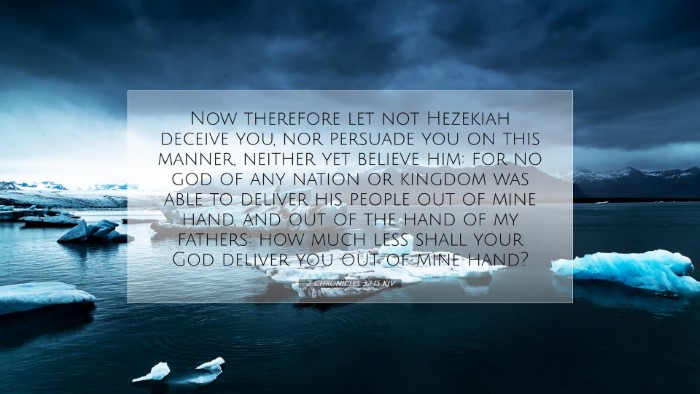Commentary on 2 Chronicles 32:15
Bible Verse: 2 Chronicles 32:15 - "Now therefore let not Hezekiah deceive you, nor persuade you on this manner, neither yet believe him: for no god of any nation or kingdom was able to deliver his people out of mine hand, and out of the hand of my fathers: how much less shall your God deliver you out of mine hand?"
Introduction
This verse occurs in a crucial moment of conflict in the life of King Hezekiah of Judah. It reflects the challenges faced by Hezekiah during the siege of Jerusalem by Sennacherib, king of Assyria. This commentary draws on insights from Matthew Henry, Albert Barnes, and Adam Clarke to unpack the theological significance and historical context of this verse.
Historical Context
The Assyrian king Sennacherib was known for his military strength and conquest of various nations. The siege of Jerusalem was marked by a plethora of intimidation tactics aimed at undermining the confidence of Hezekiah and the people of Judah. The messenger sent by Sennacherib (the Rabshakeh) spoke these words to dissuade them from trusting in the Lord. Understanding this background provides a clearer grasp of the intense pressure faced by Hezekiah.
Hezekiah's Righteousness
- Spiritual Leadership: Hezekiah reformed the worship practices in Judah and turned the people back to true worship of Yahweh (2 Chronicles 29-31).
- Trust in God: The king's reliance on God during times of distress serves as a model for faith and dependence upon divine strength (2 Chronicles 32:7-8).
Exegesis and Insights
The Strategy of Sennacherib
Matthew Henry explains the intent behind Sennacherib's words. He sought to instill fear and doubt, attempting to undermine the faith of the Israelites by comparing their God unfavorably with the gods of other nations that had fallen to his strength. Sennacherib's view of God was limited and perverse, rooted in the assumption that military might supersedes divine power.
Human Perspective vs. Divine Assurance
Albert Barnes notes that the argument put forth by Sennacherib rests on a flawed understanding of the nature of God. While Sennacherib highlights the inability of other nations' gods to save them, he disregards Yahweh's sovereignty and power. This illustrates a common theme in Scripture: the contrast between human wisdom and divine truth.
The Danger of Distrust
Adam Clarke emphasizes the perilous situation in which the people found themselves. The challenge was not just the external threat from Assyria but also the internal struggle of faith versus fear. The siege is symbolic of the trials believers face; they are often harried by doubts and fears that cause them to question the faithfulness of God.
Theological Implications
The Nature of God
- Sovereignty: The assertion that no god could deliver from his hand reflects Sennacherib's ignorance of the true nature of God. The Christian understanding is that God is above all earthly powers and His will prevails regardless of the situation.
- Faithfulness: Hezekiah's faith in God serves as a lesson that reliance on divine promise is crucial, even when faced with formidable challenges.
Trusting in God in Troubling Times
This passage encourages believers to remain steadfast in faith during crises. Hezekiah's steadfastness and his call to the people to trust God highlight the importance of spiritual fortitude and collective faith. The words of the Rabshakeh serve as a reminder of the various voices that challenge our commitment to God.
Application for Today's Believer
For pastors, students, and theologians, 2 Chronicles 32:15 stands as a powerful narrative urging believers to hold firm against fears and worldly pressure. The lessons extrapolated from this verse focus on:
- Defining True Faith: Real faith in God does not guarantee the absence of trouble, but it assures the presence of divine assistance.
- Resisting the Voice of Doubt: Sennacherib's taunts can be likened to the modern day doubts that threaten faith. Believers are encouraged to resist these voices with the truth of God's word.
- Community Support: Hezekiah called his nation to collective prayer and reliance on the Lord, exemplifying the importance of congregational support in times of distress.
Conclusion
In sum, 2 Chronicles 32:15 presents a compelling narrative of faith under siege. The commentary from Matthew Henry, Albert Barnes, and Adam Clarke provides rich insights into the historical and theological significance of this event. It serves as a poignant reminder of the importance of trusting in God amidst trials and the folly of leaning on human wisdom when contending with divine realities.


